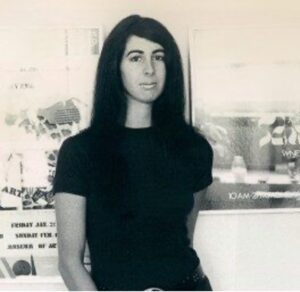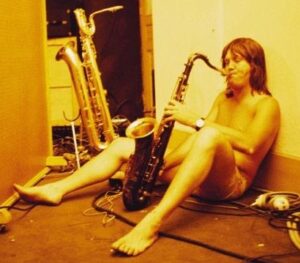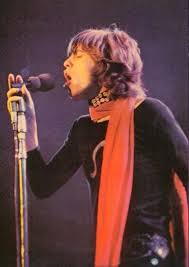Sara Davidson
|February, 17, 2024
It was a shock: seeing him recently on the cover of the…. not the Rolling Stone, but the WSJ (Wall Street Journal magazine.) He still has that arrogant/elegant/nasty vibe, but his face!
The skin is deeply wrinkled, not like the wrinkles most of us have, but thick, weather-beaten folds and ridges that start between his eyebrows and run all the way down his cheeks to his neck.

He colors his hair, wears a bright lavender suit, and appears to have on lipstick, but those elephantine wrinkles! It’s possible to have them softened surgically, so I assume he wants us to see them. This is me. Eighty fucking big ones. Deal with it.

Photos Juergen Teller
The Rolling Stones are having a moment. In October, they released their first new album in 18 years, Hackney Diamonds, which received joyous reviews, including from Rolling Stone. And in a recent interview, Mick says they’re working now on another album.
Hearing that, and seeing Mick on the cover of the WSJ, takes me back to 1970. I was in my twenties, living in Manhattan, married to the night-time host of the primo rock station in New York, and I was obsessed with Mick Jagger. I loved his voice, his songs, his strutting, and his outrageous sexuality. So I did what I always did when I wanted to meet someone—wrote an article about him.
The Stones were about to start a European tour, and I obtained an assignment from The Atlantic to cover it.
I flew to Copenhagen to join the tour, but was kicked off it after two days, for reasons I’ll explain. But I still had to do the story. So I wrote a piece I thought was slight—embarrassingly slight. I hadn’t looked at it in 50 years when I unearthed it last week.
It was in a 1971 issue of the Atlantic titled: “Mick Jagger Shoots Birds.” I started reading it and was surprised at how sharp and funny it was, not the embarrassment I’d remembered. Friends urged me to post it now, so here ’tis.
WHAT HAPPENED:
In Copenhagen where the Stones were beginning the tour, I joined the crowd of reporters and photographers camped in the lobby of their hotel. I was wearing a long, form-fitting nightgown I’d bought at Bonwit Teller that, in those days, passed as a dress, and I’d straightened my long, dark hair, so it hung to the center of my back.

“They’re coming! The Stones!” people shouted. The hotel doors burst open and in they came, along with bodyguards and staff whose job was to keep “the boys” out of reach of the press and fans. The Stones were at their zenith of popularity then, with fresh songs that both created and reflected the zeitgeist: “Jumping Jack Flash,” “Sympathy for the Devil,” “Street Fighting Man.”
As they walked past me, Bobby Keys, the saxophone player who toured and recorded with the Stones, grabbed my arm.
“You play poker?” he said.
“Um… no.”
He shrugged. “Come and watch then.”
He pulled me into the elevator where I suddenly stood face to face with Mick. I went into shock. Bobby, obviously, thought I was a groupie, and the others started referring to me as “Bobby’s friend.” When we came out of the elevator and headed for Mick’s room, Bobby asked what I was doing in Copenhagen. “Actually, I’m a reporter,” I said. He stopped short, and blew out his breath. Then he said, “Don’t mention that,” and hustled me into Mick’s room
For the rest of the night, I sat paralyzed, afraid to speak, which supported their assumption that I was a groupie, a breed who have learned to be seen and not heard. While the boys played poker, smoked joints, and engaged in raunchy talk, I concentrated on memorizing what they said. I knew that if they found out who I was, I’d be cooked. Around midnight, I made up an excuse to tell Bobby why I had to leave, and he urged me to come back the next day before the concert.

Bobby Keys
I rode with Bobby in the limo to the concert, then to the private dinner after the show, where I was seated smack across from Mick. One of the press reps for the Stones walked by, recognized me, and gave me the evil eye. I’m busted, I thought. But she said nothing. Not that night.
The following morning, when I walked through the lobby, she pulled me aside and told me I had not been authorized to “fraternize” with the boys. Bobby had been chastised, and I was persona non grata. I flew home feeling humiliated.
WHAT I WROTE in the Atlantic:
Jagger lay on his side on a couch, drinking Chateau Lafite-Rothschild from the bottle. The hotel in Copenhagen faced the North Sea, and the windows were thrown wide open. With him were three other members of the Rolling Stones and a few friends, playing poker, clowning, laughing, and rolling joints. Mick lost all the money he had on him, borrowed some, lost that, threw in his socks, and finally his room key. “There,” he said, laughing. “That’s worth a lot.”
It was the first night of the Stones’ Tour of Europe, 1970—eight countries, nineteen cities, in six weeks—and the kickoff, a press conference at the Marina Hotel, was a letdown for both press and Stones. Reporters had come from all over Denmark, Sweden, Germany, and Austria. The band walked in a half hour late with Jagger at the head, revved up and laughing, wearing a straw hat with flowers and ribbons on the brim. He flopped in a chair and started banging the table. “Can you hear the drums?” he called to guitarist Mick Taylor, and cackled. Turning to the reporters, he said, “Good afternoon, children. We’re here today to talk about religion.”
An Austrian newspaperman took over the conference. Sitting at a table with pretzels and crackers, the Austrian asked what the Stones thought of bootleg records of their music. Mick stuck out his foot in horror. “We’ve been bootlegged, lads, it’s very painful! No, we love bootlegs. Music’s for everybody, we don’t really care.”
The Austrian said, “It’s been nine months since Altamont…”
“Let’s drink to that,” Mick said, tilting a bottle of Carlsberg beer to his mouth.
The Austrian asked, “How does it affect you that the Beatles are broken?”
Mick said, “It’s good for us. I’m very sorry they broke up, but the Beatles don’t exist anymore. You’ve got to get it through your heads. There’s only us.”
The Austrian: “What is your opinion about the problem drugs?”
Guitarist Keith Richards put his head down and sighed, “Come back tomorrow.”
The Austrian asked Mick about his role in the film, Ned Kelly.
Mick: “I didn’t like Ned Kelly. Don’t bother seeing it.”
What about Performance?
“Quite good film.”
The Austrian: “The critics don’t say that.”
Mick: “I say fuck you to the critics. They write rubbish. Any more questions, before we throw beer on you? C’mon, you can do better, you really can. You get one question each, except that bloke in the center.” He pointed at the Austrian. “He’s got the most aw-ful questions. Look at him, he’s got a whole little setup of his own, sticks and nuts and beer.” The Austrian looked radiant, and as no one else spoke, plowed on. “How do you feel on the world politics?”
Mick: “We’re not interested in politics. We’re interested in music. We like playing music, live, better than talking to you.” He stood up. “Get me out of here.”
A Stones tour is like a presidential campaign, with identifying buttons, code words, security and advance men. The musicians, even Jagger, wear large purple and white buttons because police can’t always distinguish the Stones from their fans. Crew members wear red buttons, and guests blue. All the Stones except Mick have their wives or girlfriends with them.
Chip Monck, who has staged rock festivals from Monterrey to Woodstock and Altamont, is in charge of producing the show. He brought his crew from New York and had materials shipped from four countries. Everything was assembled in Copenhagen the week before the tour started, and the crew held a dress rehearsal without the Stones, to see that the setup–two forty-foot aluminum towers, a truss, stage lights, and three sets of curtains–could be assembled in 8 hours and torn down in one.
All afternoon before the concert, young people rode bikes and scooters to the hall, looking for last-minute tickets. (There were none.) At 4 p.m., the crew spread a blue carpet with a starburst in its center on the stage and vacuumed it. People sprawled about, drinking Cokes, witting for the Stones to arrive to rehearse. Two Finnish girls, who had been there for days and managed to ingratiate themselves with the crew in exchange for blue guest buttons, walked back and forth chain-smoking. They had limp straight hair and wore limp silk and velvet clothes. One had painted a star on her forehead. A British crew member said to a friend, “Those two groupies are utterly stoned. That’s why they look vacant. It’s disgusting.”
Suddenly, without anyone having seen him come in, Mick was on stage, playing the piano softly. He walked around checking equipment, testing mikes and guitars, while the band gathered around drummer Charlie Watts. Mick sang into the empty hall, thrusting his lips out in exaggerated motions. He glided over the carpet as if he had wheels on his feet, like the pawns in table hockey games, and swung the mike around his body like a baton. During “Sympathy for the Devil,” he arched his back, put one hand on his hip, let the other hang limp, and shuffled, knees floppy, head pecking forward, the length of the platform.

When the gates opened that night, Danish kids filed in carrying orange drinks and programs in English. It’s striking that while rock has pervaded the globe, it has remained an English-language medium. All the Western European countries, and others such as Poland, Mexico, and Japan, have indigenous rock groups, but not one has achieved recognition beyond its national boundaries. Rock has made English the international language of youth.
The lights went down and Mick came swooping out in a silver top hat, a black shirt with the sign of Leo on the chest, gold necklaces, a long white scarf, and black pants decorated with nail studs. The Stones played the same songs as in rehearsal, but now there was an urgency, a fierceness. Mick danced like a fiend, bumping and grinding with such force it seemed his spine might snap.
He worked harder with each song: punched his fists at the crowd, shrieked, crawled on all fours, leapt, did splits in the air. The crowd cheered, but not as raucously as in America.
During “Midnight Rambler,” Mick took off his shoes and twirled them in the air, shed his hat and scarf, then took off his metal-studded belt, raised it high and, his face a snarl, whacked the belt on the ground. Dust flew. The crowd screamed. Mick cracked the whip three more times, with diminishing results. He looked at Chip Monck and made a spiral motion with his hand. The house lights came on—a trick Jagger perfected during the American tour. Earlier, Chip had told me how it evolved: “Every time there’s been a riot at a concert, the authorities say, ‘throw on the house lights, so we can see what damage they’re doing.” It was Jagger’s idea to put on the lights in the middle of the show, so he could see the crowd. “The minute we did it, there was a burst of energy,” Chip said. “The whole audience moved. It’s impossible for a performer to use the amount of energy Jagger does without some exchange of energy with the people.”
When the band hit “Street Fighting Man,” the staff and retinue hurried out to the limousines. The Stones came straight off stage, out the door, and into the first limo. They never heard the Danish kids clapping in unison, begging, in their polite way, for more.
Back at the hotel, the restaurant was closed to the public and an elegant long table had been set for the Stones. The two Finnish girls drove up with the German press and sat in the bar, watching the party assemble. Charlie, wearing a white t-shirt with red stars, took a seat at the head of the table. “You know, lads, we’re better than we thought,” he said.
Mick came in, his face hidden under a bushy Afro wig. Everyone laughed, and passed the wig around. Makeup was running from Mick’s eyes, and he was still wearing his costume and jewelry—a gold serpent choker and a necklace strung with bullet cases, tusks, and animal feet. One of his suitcases, lost the day before, had just been delivered. “I had more stuff in there than I remembered. Like white leotards,” he said with a laugh.
Charlie said, “Did you have a good time?”
“Yes,” Mick said. “You could hear the drums beautifully where I was. Every time you hit a roll it went right through me. Keith was terrific tonight. And Mick Taylor played a great solo on “Love in Vain.” He never gets it on in rehearsal. You know why? He’s lazy.”
After hors d’oeuvres of shrimp, caviar, melon and prosciutto, the waiter brought out a tray of roast veal. Mick and Charlie had ordered lamb. The waiter stammered, “A mistake in the kitchen.” Jagger mimicked the waiter’s accent: “No weal! We can’t eat weal, on moral principles. We don’t like the way they kill the animals.” He drew a finger across his neck. He accepted the veal, though, and after he’d taken a few bites, a German photographer walked up and called to him. Mick stiffened, and looked aside guardedly. The photographer said, “If you want one of those two girls, you should say so.”
Mick bounced around. “Where? Which two? Come back.” A few minutes later, one of the Finnish girls slouched out of the bar and into the lobby. Mick studied her and grinned at Charlie and Keith. “Oh, yes. I like her. Looks about fifteen.” One of the wives went to scope out the girl, came back and said, “She’s horrid!”
Mick patted her hand. “Now, now, it’s all a matter of taste.” He nudged Charlie. “Go and get that bird for me.” Charlie laughed.
sounds like both you and jagger have still got it, Sara. i’ve seen a lot of good acts but never saw the stones. they are indeed timeless. in their song “The Spider and The Fly”, the early version has a line about the washed out blonde on the left – “…she was common, flirty, looked about thirty…”. a much later version morphed into “…she was common, shifty, looked about fifty…” i love it and your piece fleshes out the dark joys and gritty nature of a rock band on the road that is hinted at in the song. good writing and good, crisp memories from 5 decades ago.
This article was fun to read. But the following in the introductory words summed up my feelings exactly about Mick Jagger, from 1964 – ? : “…and I was obsessed with Mick Jagger. I loved his voice, his songs, his strutting, and his outrageous sexuality.” Most of my friends thought I was crazy and extreme! Maybe because I had a poster of Mick over my bed in my Boston U. dorm room!?
I can identify. My husband was obsessed with Brigitte Bardot, so he understood my obsession with Jagger. He supported my going to Copenhagen to write about him.
This is wild, Sara, loved it.
I loved your article! Back in the 60s I loved the Stones and at a party my husband, a little drunk at the time, did an imitation of Mick singing and hopping around, and friends said my husband looked like Mick and from then on they called him Mick Lips. Those were the days!
Sara, Loved the article and your front row perspective. You knocked it out of the park. So glad the Stones are still creating new music. A great testament to the fact that being 80 or over doesn’t mean you are dead yet. We need great role models like this
I spent time in Mustique at a few Princess Margaret’s dinner parties with Mick and wife Bianca in the mid ’70’s–he was incredibly smart and no drugs were done in front of us then. When I see him perform now, I could hug him as an inspiration, showing how much stamina is possible at his age, but also the collective creativity. The Stones are simply the BEST. You were so lucky for your experiences when they were true full-on rock band behavior…thanks for sharing!
sara – that’s a great story. these days, i don’t think the stones are very accessible. i’ve seen the band six times. the first was 1981 in pontiac mi. the last time was in denver in 2018 at a rescheduled show after mick’s heart attack and before charlie died. i make documentary movies and write books, so i tru to put myself in positions like yours with the hopes of stumbling onto a good story!
I love these stories of your experiences! You are a link to such an interesting time. I was just a young teen so my experience of the times was much more of an observer. I did get to see the Stones on their Exile on Main Street tour. I have such fond memories of that event. I can’t believe my mother let me go!
Powerful trip down a memory lane that captures all that music and raucous life the Stones created. Great writing!
Sara, you captured Mick Jagger’s essence, both today and in 1970. And what a great story you got, despite having to act as if you weren’t a reporter! His comments and general behavior bring back all the sexist ways that used to be acceptable but are now….well, creepy and dangerous.
What a lucky break, so it seems, in a way to be allowed into the inner circle no matter how brief. With people and bands, a microscope is better than a telescope. Enjoyed your piece because it more resembled a story than a reporting.
I thoroughly enjoyed reading this article. It really truly caught the whole atmosphere and vibe of what was really going on in that time of rock ‘n’ roll history. I find it absolutely amazing that you were able to take in that much detail in such a short amount of time! It is my biggest, wish that you would’ve been allowed to stay on that tour as you have an incredible gift for capturing culture as it’s being developed. Rock ‘n’ roll culture is unique to each artist and it would’ve been a real gift to them to have a writer like you for the whole tour. shame on that girl for stepping in where she did not belong and stopping your opportunity to continue capturing something so important in music culture. I hope that truly uncool person grew up to understand and realize just how truly mean her PowerPlay was. I congratulate you and applaud you for staying focused under such emotional disappointment of your unjustified removal. Your writing this Rolling Stones experience is something that will help musicians and musical history last forever for many generations to learn from. I am a singer. You are a great writer. Thank you for sharing your skill and your time with the stones. Thanks to you, a part of me feels as though I was there with you.
Thanks! I never listened much to them. 🙂 However, you had a very interesting life!!
What an amazing story! Loved it!
Ever since reading Loose Change I have enjoyed your writing. Each of your blogs that cross my email have been throughly enjoyed. Thank you for your words.
Exactly my thoughts. Another good book Sara wrote is “Leap.” One last thought regarding the Stones…ewww, a 15 yo girl? Did anyone else think that was creepy?
Sara, this was so entertaining! I was living it…thanks for sharing your great article.
Riveting Sara, brings it all back
testing again monday